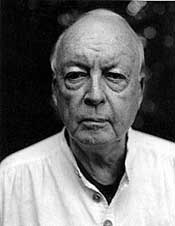Jonathan Williams
1929 – 2008
For fifty years, give or take, Jonathan Williams has been one of the most complete men of letters our nation has had to offer, underappreciated by all but a few for all of that time. Williams was named by Larry Fagin on his original list of “Neglectorinos” when that discussion first began on this website two years back, a discussion begun by none other than CA Conrad, one of the writers I would point to as reflecting Williams’ influence. But I could say that of so many poets & such diverse ones as well, from the late Ronald Johnson – for some years early on, Williams' lover – to Clark Coolidge to Tom Meyer, Williams’ partner now for nearly four decades, even to yours truly. I don’t know anyone who has taught people more clearly about the role of laughter in poetry, or the limitless value of a terrible pun.
But such writing can make it hard for some folks to actually think you’re serious. And Williams’ neglect is compounded by to the fact that he has mostly remained in his rural region of North Carolina, the local kid who happened to attend Black Mountain College right when Charles Olson was King Mastodon at that facility, plus because, when his peers were in New York & San Francisco getting famous soon thereafter, he was pulling a stint in the army – hard to envision for somebody just as far out of the closet as Williams has been since day one – and no doubt also because of the gruff exterior he sometimes presents to the world, as tho one has just stumbled on a backwoods version of British royalty. Whenever Williams has ventured forth from
One index of this neglect is that you can still buy many of Williams’ books dating back to the mid-1970s from Small Press Distribution. Of Williams’ most recent collection, I wrote here
Jubilant Thicket is one of those absolute must-have books of poetry.
It’s nice to see, in retrospect, just what good sense I have. Lately, tho, I’ve been going through the somewhat earlier Blackbird Dust, from Turtle Point Press. A collection, as the subtitle puts it, of essays, poems, and photographs, Turtle Point actually lists the volume under non-fiction, perhaps because fiction’s the only thing Williams didn’t seem to do. One of the masters of the small press whose imprint Jargon is legendary, Williams was the first publisher of The Maximus Poems – I think he was still in the army at the time – a major photographer (his portraits of Louis Zukofsky, gracing the cover of Mark Scroggins' new biography as well as the recent Chicago Review issue dedicated thereto, are becoming canonical), a big time serious poet – he is the last living member of the Projectivist or Black Mountain section of The New American Poetry – and an essayist whose work in the form is as full of fun & mischief as is his poetry. And as for the poetry, the following are the opening lines from “Amuse-Gueules for Bemused Ghouls”
good titles occur to
me all the time
like i have a
nephew who is a
prtocologist from greer south
carolina and other poems
HOMAGE TO LEE SMITH
one-eyed jesse waldron lives
all by hissef up
in the paw-paw gap
*
justine poole always says
fuckin’ is fine as
far as it goes
two jewish ladies meet
in central park one
of them has a
new baby in a
carriage what’s the baby’s
name says one it’s
shelley says the other
how nice that you
named her after a
famous poet shelley temple
was a famous poet
“Gueules” is French for mouths & the term is a synonym for the amuse-bouche I’m more familiar with – literally mouth amuser – as an offering from the chef in advance of the meal’s first course. It’s a perfect metaphor for Williams’ own writing, which tends to such rollicking series of half-naughty humor. The trick, I think, is in seeing just how serious poems such as this really are. What Williams is offering the reader is not simply a series of puns & wild yarns, but rather a vision of the world itself, one in which people are a little daft, but possessing nonetheless profound common sense, the language conspiring to reveal both sides of the human coin at once.
The essays in this collection often enough the same tone as the above amuse-gueules, such as a letter to the New York Times concerning the idea that there are “only 83 poetry readers in the entire nation” in spite of “the collective efforts of 64,980 busy, untalented, published poets, plus the National Entombment for the Arts.” Many of the essays, tho, are eulogies, for Ernest Matthew Mickler (author of the White Trash Cookbook), Robert Duncan, Paul Potts, Joel Oppenheimer, Art Sinsabaugh, Virginia Randall Wilcox, James Laughlin, Ronald Johnson & James Harold Jennings. In a way, such accounts are a summing up for an entire generation, one that is now fast escaping us. To this, Williams adds his advocacy for the decidedly marginal in American letters, including a profile of Alfred Starr Hamilton that Williams managed to place in the New York Times Book Review in 1975, a time when Hamilton was apparently still managing to survive in his $40 per month rooming house tho the $7,000 he had inherited from his mother 11 years earlier had apparently run out. Williams made a point of including
This wonderful volume is a sad book only insofar as the world it often describes – not unlike







